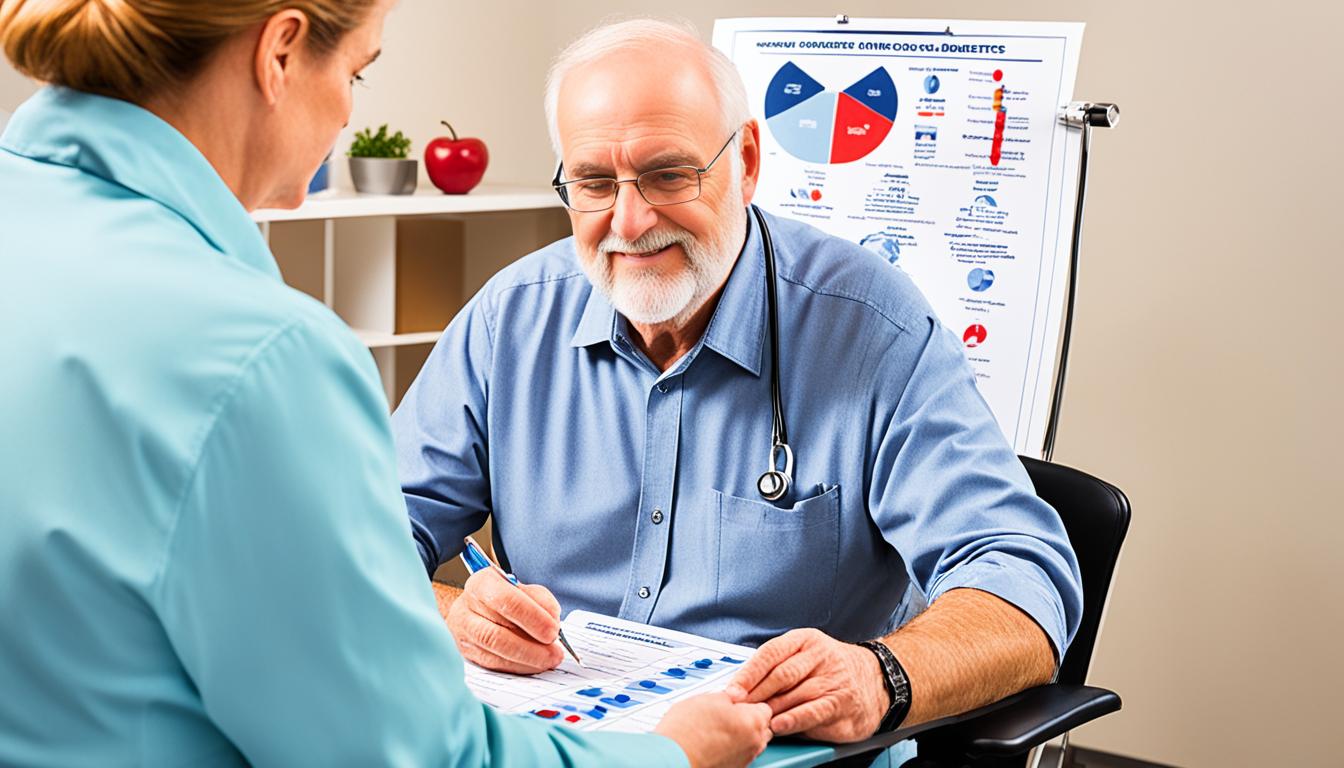What is a Certified Diabetes Educator (CDE)?
More than 34 million Americans have diabetes. Because of this, we need experts in diabetes care. Certified Diabetes Educators (CDEs) are those experts. They help a lot of people understand and manage their diabetes.
CDEs are specialists in diabetes. They help people know their condition better. They work with families to give personalized advice, support, and education. This is about both dealing with diabetes and stopping it from happening.
Key Takeaways:
- A Certified Diabetes Educator (CDE) is a specialist who helps with diabetes care.
- CDEs give one-on-one help and advice on managing diabetes.
- They are key in helping people learn about their diabetes. They figure out a plan to treat it and change their lifestyle.
- The Certified Diabetes Care and Education Specialist (CDCES) title means they are really good at what they do.
- CDEs help people be in charge of their health and get better outcomes.
CDE Qualifications and Certification
To become a Certified Diabetes Educator (CDE), you need to have special qualifications and certifications. People who become CDEs are usually professionals like nurses, dietitians, pharmacists, and doctors. They get extra training in diabetes care to earn the CDE certification. This shows they are experts in helping people manage their diabetes.
If you want to be a CDE, you need to be well-educated in your field. This means having a degree in areas like nursing, nutrition, or pharmacy. You also need hands-on experience helping people with diabetes.
After meeting these qualifications, you can take the CDE exam. The exam tests your knowledge on topics like self-care, nutrition, and exercise. Passing the exam shows you’re skilled at helping diabetes patients.
Benefits of CDE Qualifications and Certification
Having CDE qualifications makes you an expert in diabetes care. This can lead to better job opportunities and allows you to be a leader in diabetes programs. It boosts your career’s success and enhances your professional image.
Being a Certified Diabetes Educator lets you really help diabetes patients. You can give tailored advice to improve their health and prevent complications. You become a partner in managing their condition.
People with CDE qualifications are valued for their knowledge. They lead teams that care for diabetes patients. By working with other health professionals, they improve the care diabetes patients receive.
Getting CDE qualifications shows your dedication to your diabetes patients. It means you always want to learn more to help them. This is a big step in making sure people with diabetes get the best care.
If becoming a CDE interests you, look for specialized programs in diabetes care. These programs teach you about the latest in diabetes treatment, like behavior change and new self-care methods. They help you grow as a healthcare professional so you can make a real difference for diabetes patients.
Role of a CDE in Diabetes Management
A Certified Diabetes Educator, or CDE, is crucial in aiding those with diabetes. They offer thorough education, advice, and support. CDEs work closely with patients. They ensure a detailed grasp on their condition and help craft personalized care plans for managing diabetes well.
CDEs help patients set achievable goals to manage their blood sugar effectively. They give important advice on food and help patients understand how to eat better. CDEs also teach how to use insulin and manage other medications.
“My focus as a CDE is empowering those with diabetes to own their health. I work on both physical and emotional parts of dealing with diabetes. This improves their overall health and helps achieve lasting positive results.” – Emma Johnson, CDE.
Besides physical health, CDEs also address the mental impact of diabetes. They offer support to deal with the emotional stress of the illness. By fulfilling these various needs, CDEs are key in increasing the quality of life for patients.
The Benefits of Patient Education
CDEs are deeply involved in educating patients. They help patients understand how to manage diabetes themselves. This knowledge enables patients to make better choices about their health. Thus, they can keep their condition under control and see better health results.
- Better blood glucose management is achieved by knowing how lifestyle can affect blood sugar. Patients can then tweak their diet and exercise. This helps in keeping blood sugar stable.
- Learning about potential diabetes complications helps patients act to avoid them. Prevention or lowering risks is the key.
- Education encourages self-care, making patients more in charge of their health. This sense of control aids in daily diabetes management.
- Understanding one’s treatment leads to better adherence. Patients following their treatment properly see better health results.
Through education, advice, and support, CDEs encourage patients to actively manage their diabetes. This leads to better disease coping, improved health, and increased life quality.
Importance of the CDCES Credential
The CDCES credential is very important. It’s valuable for employers, healthcare workers, and those with diabetes. It shows someone has the skills to provide great diabetes care and education.
Getting the CDCES credential means you’re serious about helping patients. It proves you know a lot about treating diabetes. This helps people with diabetes get the best care to manage their health better.
Employers see the CDCES credential as a mark of excellence. It sets you apart from others in the field. You become a key member of the healthcare team, bringing top-notch care to patients.
For health workers, having the CDCES opens new job opportunities. It can lead to roles where you work closely with diabetes patients. This way, you get to make a direct impact on their lives.
For those with diabetes, the CDCES credential is also important. They look for specialists with this certification. They know they’re getting care from someone who focuses on their needs.
Overall, the CDCES credential helps everyone involved. It sets a high standard for diabetes care. It means better opportunities for health workers, and better health outcomes for patients. With this credential, you can make a positive change in the lives of those with diabetes.
Becoming a CDE
To become a Certified Diabetes Educator (CDE), there’s a clear process. It mixes your educational background with on-the-job experience. First, you need a solid education, practical experience, and the required licenses or certificates.
After meeting these basic needs, you can apply for the CDE certification. This involves sending in an application. Then, you must meet the organization’s specific standards. The final step is passing an exam that tests your diabetes care and education knowledge.
Working through these steps helps doctors, nurses, and others in healthcare. It makes them better at caring for and educating people about diabetes. Eventually, it earns them the title of a Certified Diabetes Educator.
CDE Certification Process Overview
Here’s a quick look at the steps to become a CDE:
- Get the right schooling and work experience.
- Have the necessary licenses or certificates from your field.
- Apply with an org that certifies CDEs.
- Meet the organization’s requirements.
- Pass an exam showing you know about diabetes care and education.
CDE Training Opportunities
Getting your CDE is big, but there’s more to learn. Specialized training programs boost your diabetes knowledge. They make you better at helping and teaching others.
You can find these programs online or in the real world. They cover everything from managing diabetes to talking with patients. You also learn about the newest ideas in diabetes care. Plus, you get to practice what you learn.
Extra training makes you a stronger professional. You’ll have a bigger impact on people with diabetes.
| Step | Description |
|---|---|
| Step 1 | Complete the required qualifications, including formal education and clinical experience. |
| Step 2 | Obtain specific licenses or certifications within your respective healthcare profession. |
| Step 3 | Submit an application to an accredited certifying organization. |
| Step 4 | Meet the specific criteria set by the organization. |
| Step 5 | Prepare for and pass the examination to demonstrate your knowledge and competency in diabetes care and education. |
CDCES Exam Preparation and Resources
Are you getting ready for the Certified Diabetes Care and Education Specialist (CDCES) exam? No need to stress. There are many resources to help you succeed. You can choose from classes in person or online. Each one will cover the vital topics of diabetes care and education.
One top resource is the study guides made for the CDCES exam. These guides give a clear picture of what you need to know. They talk about managing diabetes, educating patients, and the CDCES’s role. You’ll also get sample questions and practice exams. These are super helpful to see how the real test will be.
Online practice exams are also a great idea. They let you practice under test conditions. You’ll find out how ready you are. Plus, you’ll get feedback on what areas you need to study more.
To do well on the CDCES exam, you must really understand diabetes care and education. Using these resources for study is key. Also, try methods like taking notes, using flashcards, and regularly reviewing important points.
Many groups and websites have resources for the CDCES exam. Take time to look through them. Pick the ones that match how you like to learn. You can also ask CDEs or other healthcare pros who have passed for advice.
With all these materials and resources, you’ll be prepared for the exam. Remember to study wisely and seek help when you need it. Good luck on your path to becoming a certified CDE!
Essential Resources for CDCES Exam Prep:
| Resource | Description |
|---|---|
| CDCES Study Guides | Comprehensive guides covering all essential topics and providing sample questions and practice exams. |
| Online Practice Exams | Simulated exams that mimic the format and difficulty level of the actual CDCES certification exam. |
| Recommended Websites | Websites offering a wide range of CDCES exam resources and study materials. |
| Peer Recommendations | Seeking advice and recommendations from experienced CDEs and healthcare professionals who have successfully passed the exam. |
Benefits of CDCES Certification
Getting the CDCES certification is great for those focusing on diabetes care and education. It shows you are very skilled and committed to giving top-notch care to people with diabetes. Here are the main perks of having this certification:
- Enhanced Career Opportunities: With the CDCES certification, you stand out as a top professional in diabetes care. This can lead to more job options in places like hospitals, clinics, and private practices.
- Professional Growth: This certification shows you are always learning and improving. It proves you keep up with the newest findings and best ways to help people with diabetes.
- Increased Demand: Because diabetes is becoming more common, the need for experts is growing. Organizations and individuals trust CDCES-certified professionals for their deep knowledge and advice.
- Expertise in Diabetes Management: Being CDCES-certified means you know how to help individuals manage their diabetes well. You will excel at creating personal care plans, teaching how to self-manage, and dealing with the emotional sides of diabetes.
- Improved Patient Outcomes: With a CDCES by their side, people with diabetes learn to take charge of their health. This education and support lead to better health and a happier life for many.
Getting the CDCES certification is not just about career growth. It also means you’ll make a big difference in how well people with diabetes manage their health and life.
CDCES Credential Renewal
As a Certified Diabetes Educator (CDE), keeping the CDCES credential current is key. It helps you stay on top of the newest info and methods in diabetes care. This is how CDEs ensure they give top-notch care to those with diabetes.
To renew the CDCES credential, you need to do certain continuing education activities. These activities boost your knowledge and skills in handling diabetes. You can do things like go to conferences, attend workshops, or take specific diabetes care courses. They help you learn the latest in research, treatment, and teaching tactics.
When renewing, CDEs may need to show proof of the education activities they’ve done. This proof confirms CDEs are actively improving their skills and knowledge. It means they can give the best advice to people with diabetes based on the latest facts.
Part of the renewal might mean paying a fee. This fee supports maintaining the CDCES credential. It also helps offer resources for CDEs’ professional growth.
Renewing the CDCES credential shows CDEs’ ongoing commitment to professional growth and excellent care. It highlights their effort to keep up with changes in diabetes care and teaching. This helps the people they care for in the end.
Staying up to date through education and renewal keeps CDEs’ skills and professionalism sharp. It means they can provide those with diabetes the most up-to-date and effective care. This ensures the best health results for those they serve.
| Benefits of CDCES Credential Renewal |
|---|
| 1. Enhanced Knowledge: Keeping the CDCES credential renewed helps CDEs know the latest in diabetes care and education. |
| 2. Improved Patient Care: Renewed credentials allow CDEs to offer the best care, based on current evidence, to those with diabetes. |
| 3. Professional Development: The renewal process supports CDEs’ continuous learning and growth, which is good for their personal and job development. |
| 4. Professional Recognition: An active CDCES credential shows others a CDE is committed to doing their best and keeping up with their field. |
Renewing the CDCES credential highlights CDEs’ dedication to growth and quality care. This way, by staying informed and updated, CDEs keep helping people with diabetes live better and healthier lives.
Finding a CDCES Near You
If you or someone you know has diabetes, finding a Certified Diabetes Care and Education Specialist (CDCES) is important. This specialist can offer personalized help and advice for managing diabetes. They help you understand your condition, making a plan to control it. This can lead to better health outcomes.
A CDCES is there for all aspects of diabetes care. They can help with managing medications, checking blood sugar, giving food advice, and offering emotional help. Working with them means getting expert advice that fits your needs.
“Finding a CDCES near you is essential to ensure you receive the specialized care and education necessary for effective diabetes management.”
The CDCES directory is a place to find these professionals in your area. You can search by location, specialty, and expertise. This helps you find the right healthcare partner who can support you in managing your diabetes successfully.
CDCES professionals know a lot about diabetes care. They help you handle the complexities of the condition. They give you insights, resources, and support, which empowers you to manage your health better.
Benefits of Finding a CDCES
Finding a CDCES has many benefits:
- Personalized guidance and support in managing diabetes
- Expert knowledge and up-to-date information on diabetes care
- Assistance with medication management and blood glucose monitoring
- Dietary recommendations tailored to your specific needs
- Emotional support and strategies for coping with the challenges of diabetes
- A trusted healthcare partner who understands your unique circumstances
With a CDCES, you’ll learn more about diabetes and create a plan to manage it. This can improve your health. Use the CDCES directory to find a professional close by and start today.
The Value of CDCES Certification
The CDCES certification is vital for healthcare workers and people with diabetes.
Earning this certification shows that a healthcare worker knows a lot about diabetes care. It creates new job chances and helps them grow in their careers. It also means they are committed to providing top-notch diabetes care.
For those with diabetes, a CDCES brings many benefits. They are experts who can help with personalized advice to manage the disease. The CDCES is skilled at making treatment plans that fit the patient’s needs, aiming for the best health results.
Earning the CDCES certification is a mark of excellence that improves the overall quality of diabetes management and empowers individuals to take control of their health.
CDCES certification shows healthcare workers are top experts in diabetes care and education. It boosts their credibility and makes them key members in health teams. Employers love CDCES-certified staff for their special skills and quality care.
Working with a CDCES means you get the best care and advice. They deeply understand diabetes and can address what you need uniquely. This includes advice on medicine, lifestyle changes, and emotional support, helping to manage the disease and improve well-being.
The CDCES certification shows how dedicated a healthcare worker is to learning and staying updated on diabetes care. It promises that people with diabetes get the latest and proven care. Working with a CDCES can make managing diabetes feel more secure and supported.
The Benefits of Being a CDCES
Becoming a CDCES leads to many job options for healthcare workers. As more diabetes educators are needed, there’s a bigger space in the job market. CDCES-certified people can work in different healthcare places, from hospitals to schools.
The CDCES certification offers healthcare professionals the chance to make a meaningful difference in the lives of individuals with diabetes.
As a CDCES, healthcare workers can really help those with diabetes. They help these individuals gain better control, which leads to improved health and life quality.
In conclusion, the CDCES certification is great for healthcare workers and those with diabetes. It represents expertise, professionalism, and a strong dedication to top-quality care and education. With a CDCES’s help, people with diabetes can get personalized support and knowledge, making it easier to manage the disease and live healthier.
Conclusion
Certified Diabetes Educators (CDEs) are key in helping manage diabetes. They teach patients how to understand and control their condition. By becoming Certified Diabetes Care and Education Specialists (CDCES), these professionals show they offer top-notch care and education.
The CDCES title is important for both professionals and patients. It shows a deep understanding of diabetes care. For patients, it means getting superior advice and health improvement. This certification boosts the quality of diabetes care and helps people work towards better health.
In short, CDEs make a big difference in the lives of those with diabetes. They offer personalized help and knowledge. By always learning and keeping up with new diabetes treatments, CDEs greatly help their patients. They empower individuals to lead healthier, happier lives.
FAQ
Q: What is a Certified Diabetes Educator (CDE)?
A: A Certified Diabetes Educator (CDE) is an expert in diabetes care and education. They offer advice, support, and tailored education to people with diabetes. This helps them handle their condition better and improve their health.
Q: What are the qualifications and certifications required to become a CDE?
A: To become a CDE, one must work in healthcare. This includes jobs like registered nurse or pharmacist. They also need special training in diabetes care and education. Then, they must get the right certifications.
Q: What is the role of a CDE in diabetes management?
A: A CDE is key in managing diabetes. They give in-depth education, guidance, and support. CDEs help patients get their condition, make treatment plans, change their lifestyle, check their blood sugar, advise on diet, show how to use insulin, and handle the mental side of living with diabetes.
Q: Why is the CDCES credential important?
A: The CDCES credential is crucial in diabetes healthcare. It shows a high level of skill in diabetes care and education. This credential boosts job chances and ensures better care for people with diabetes.
Q: How can I become a CDE?
A: To become a CDE, you need to meet certain qualifications and get certified. This includes finishing the right education, having clinical experience, and getting the CDE certification from an official organization.
Q: What resources are available to prepare for the CDCES exam?
A: There are many tools to help you get ready for the CDCES exam. You can find classes, study materials, and practice tests. These resources cover all the important topics in diabetes care and education, helping you pass the test.
Q: What are the benefits of earning the CDCES certification?
A: Having the CDCES certification shows that you know a lot about diabetes care and education. It opens up more job opportunities and shows that you’re a pro in helping people with diabetes.
Q: How do CDEs renew their CDCES credential?
A: CDEs renew their CDCES credential by doing more learning activities, such as going to conferences. They also need to show proof of these activities and pay a fee for renewal.
Q: How can I find a CDCES near me?
A: Use the CDCES directory to find a local CDE. They can provide the help and support you need to manage diabetes well.
Q: What is the value of the CDCES certification?
A: The CDCES certification is very important in diabetes care. It shows that a healthcare worker is skilled, dedicated, and ready to offer top-notch care and education.







